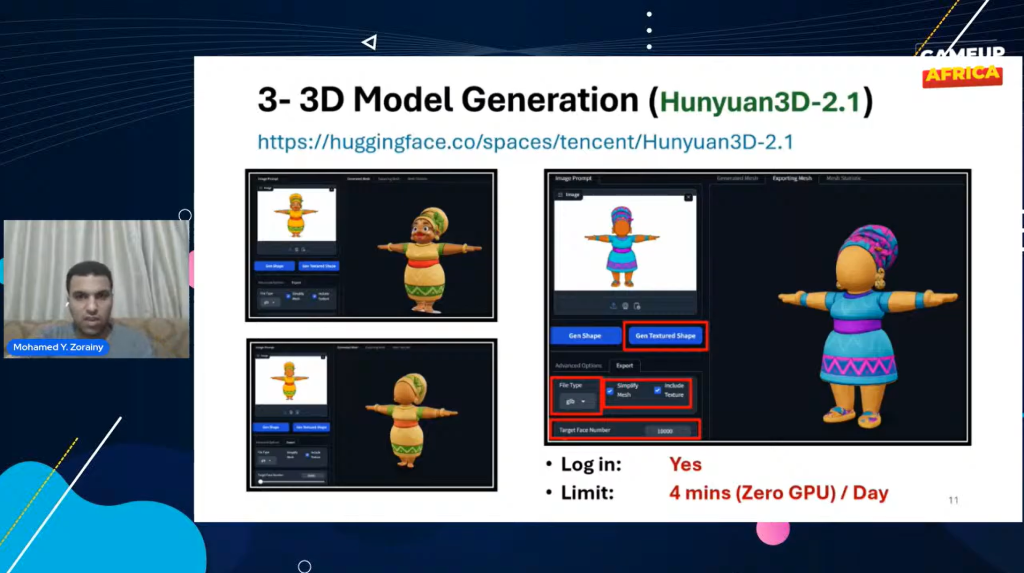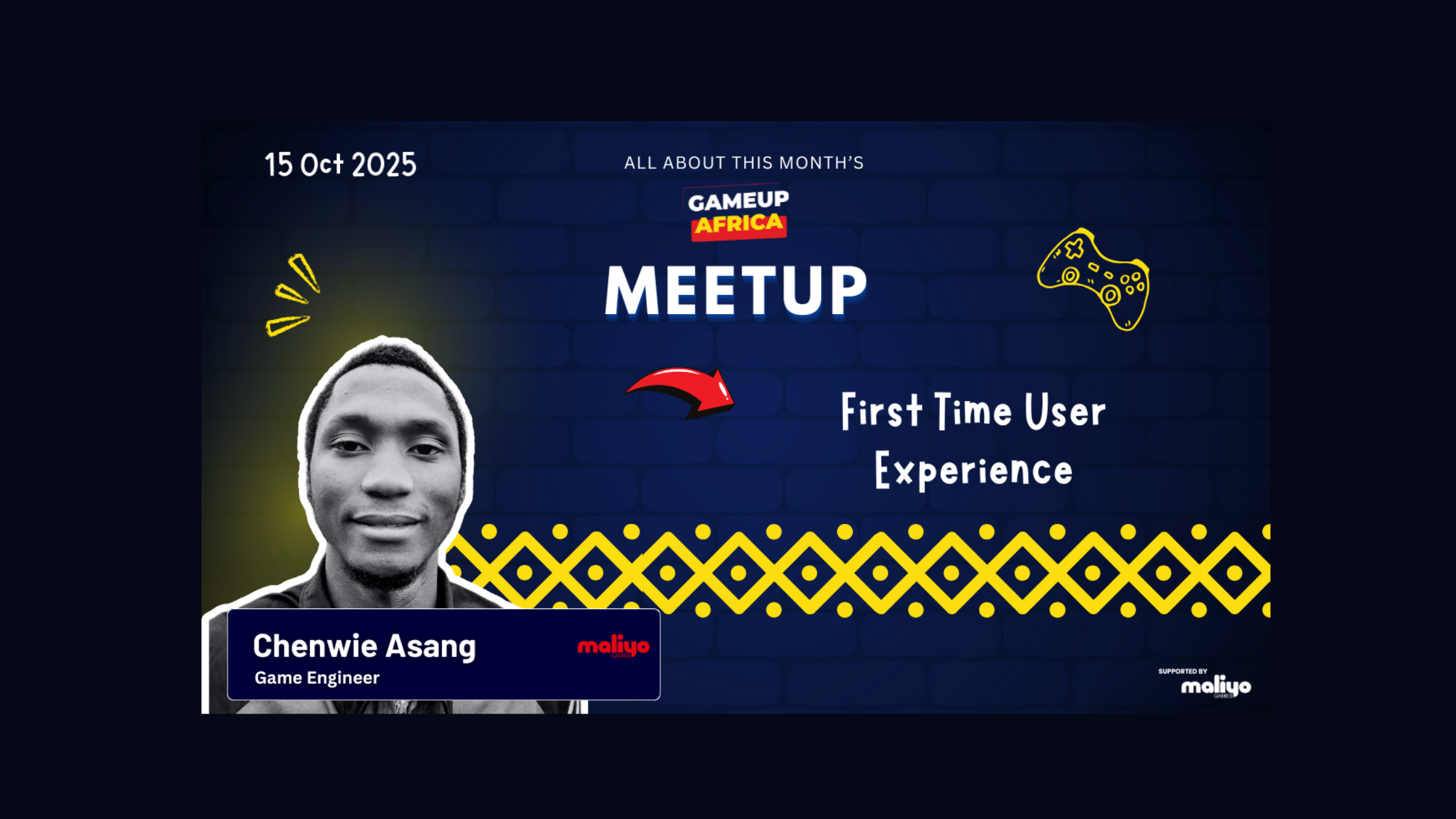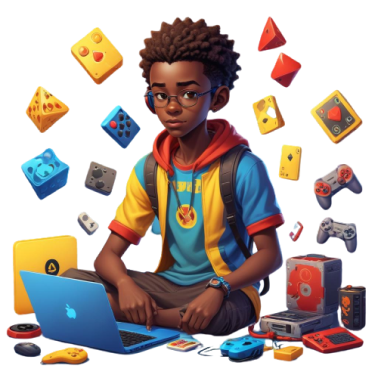The October 2025 edition of the GameUp Africa Meetup featured another engaging learning session, this time focusing on one of the most critical aspects of game design: the First-Time User Experience (FTUE).
Leading the session was Chenwie Asanag, Game Engineer at Maliyo Games, who took participants behind the scenes of Safari City, Maliyo’s flagship match-3 renovation title. The session explored how first impressions can make or break player retention, the psychology behind onboarding, and how Safari City’s design team creates an intuitive, rewarding introduction for new players.
The meetup also featured two showcases. Marvelous Akinkunmi, a 3D artist at Maliyo Games, shared insights into the stylized visual design and property creation in Safari City. Meanwhile, Mohamed Zorainy, a GameUp Africa alumnus, demonstrated how AI tools can streamline 3D character creation and animation workflows.
Chenwie Asang: Understanding the First-Time User Experience
In his talk, Chenwie Asanag — fondly known as Kiera — unpacked the concept of the First Time User Experience (FTUE) by connecting it to real-life “firsts” we all remember: the first day at school, the first time acing an exam, or even a first date. Each of these moments, he explained, carries expectations and heightened sensitivity, and the same principle applies to players trying a game for the first time.
“When players install your game, you only have a short window to impress them,” Kiera said. “If the experience doesn’t quickly deliver on what was promised, you risk losing them immediately.”
He emphasized that FTUE goes beyond flashy visuals — it’s about delivering on the player’s expectations fast, minimizing friction, and creating a sense of progress and reward early on. Using Safari City as a case study, Kira broke down the journey from store listing to gameplay.
Setting the Stage: Store Listings and Acquisition
The FTUE begins long before the player even opens the game. The store listing — on Google Play and Apple App Store — is the player’s first point of contact. For Safari City, Maliyo Games carefully curates visuals, trailer clips, and event updates (like the Nigeria Independence Day event) to set accurate expectations and attract the right audience.
“Your store page is like your storefront,” Kira noted. “It should promise exactly what the player will experience once they hit ‘Install.’”
~

Onboarding and Early Gameplay
Once players launch the game, Safari City keeps the onboarding sequence tight, intuitive, and rewarding. Players are immediately introduced to the renovation loop — fulfilling the core promise of rebuilding a city — before learning the match-3 mechanic, which fuels progression.
The team ensures that onboarding teaches core gameplay quickly and clearly without overwhelming players with too many features at once. “We introduce early wins within the first 10 minutes,” Kira explained, referring to how players restore their first property almost immediately.
He also shared how Safari City evolved based on user feedback, such as improving win animations and refining UI layouts to reduce visual clutter. “Good feedback never makes a game worse,” Kira added. “It only makes it better.”
~
Progression, Retention, and Playtesting
Beyond onboarding, Kira outlined the role of progression systems in keeping players invested. In Safari City, every renovation and story episode is designed to provide emotional payoff through cutscenes, new characters, and evolving storylines.
Retention mechanisms — like daily rewards, push notifications, and mini-games — encourage repeat play sessions, while consistent playtesting ensures the FTUE remains polished. Kira explained that the Maliyo team frequently tests with real players to uncover pain points, balance difficulty, and refine UI/UX.
Missed the meetup? You can still catch the replay on Maliyo Games’ YouTube channel.
🎥 Subscribe and watch the full recording on the Maliyo Games YouTube channel
~
Marvelous Akinkunmi: Safari City Property Showcase
The next session featured Marvelous Akinkunmi, a 3D artist and fine artist at Maliyo Games, who shared how Safari City’s environments and buildings capture the spirit of African architecture and everyday life while maintaining a stylized, accessible look for casual players.
Using tools like Blender, Substance Painter, and Photoshop, Marvelous detailed his process of translating concept art into 2D renderings for the game’s renovation scenes. Each building goes through stages of research, block-out, detailing, and texturing, with every design choice influenced by the game’s narrative and player progression.
“Our goal was to make Safari City feel familiar to African players — the colors, the structures, even the patterns are drawn from local inspiration,” he explained.
Marvelous also highlighted the team’s 3D-to-2D workflow that balances quality with optimization, ensuring the game runs smoothly on mobile devices without sacrificing its vibrant look.

~
Mohamed Zorainy: Accelerating Creation with AI
The final showcase was led by Mohamed Zorainy, a GameUp Africa alumnus and current GameUp Africa Elite participant. He demonstrated a streamlined pipeline for AI-assisted 3D character creation, aimed at developers with little to no artistic background.
Using free tools such as Image Describer, Pinterest for inspiration, and AI-based modeling platforms, Mohamed showed how developers can create, rig, and animate characters efficiently — all while maintaining decent visual quality for mobile games.
“This workflow isn’t meant to replace artistry,” Mohamed noted. “It’s meant to empower developers, especially solo creators, to work faster and smarter.”
~

~
MaliyoCON 2025
MaliyoCON 2025, the first-ever mobile games industry conference in Nigeria, is happening on December 11th in Lagos. The event will gather developers, investors, and creators to spotlight Africa’s growing gaming ecosystem.
You can learn more and register via https://www.maliyo.com/conference/
~
✨ That wraps up our October GameUp Africa Meetup recap. Stay tuned for November’s session, and keep building, learning, and leveling up with the community.
Follow us on social media at @gameupafrica_ and GameUp Africa’s LinkedIn page.






